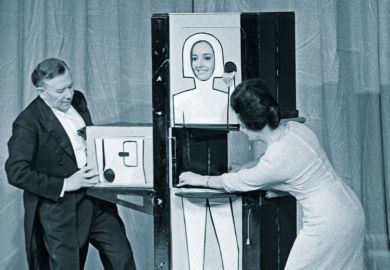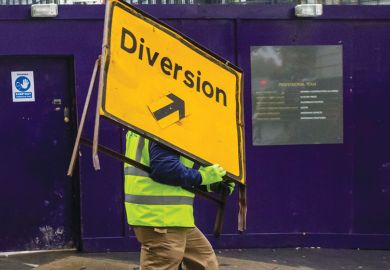Academics in UK universities are being undervalued to the tune of billions of pounds because the sector is “operating in a state of extreme market failure”, according to a damning analysis.
The report, which estimates the “true economic value” of higher education in the country, says staff are “taking the brunt” of a system that is “completely out of kilter”, mainly because domestic tuition fees and research income do not reflect the value of what universities produce.
It warns that without action to address these fundamental flaws, the sector will face a brain drain of top talent and a slide into mediocrity compared with other higher education systems around the world.
The analysis, by Ursula Kelly and Iain McNicoll of Viewforth Consulting, a specialist consultancy that looks at the economic, social and cultural impact of universities, uses economic theory to estimate the full value of universities’ teaching, research and other activities rather than relying on figures in published accounts.
It concludes that the total economic value of the sector was £44.96 billion in 2016-17 – the most recent year for which there was enough data for analysis – almost £10 billion more than the revenue actually generated by institutions.
This gap was caused primarily by two main factors: fee caps for domestic (and at the time European Union) undergraduate courses not reflecting the value of such teaching, and research income from public and charitable funders not matching the full value of research.
Most of the gap was bridged, the report says, by university staff, especially more senior academics of lecturer grade and above, who were being paid £5.35 billion less than their economic value.
The report says the implications of the analysis are “grim”, including a brain drain of “the most talented staff leaving the sector for higher paid careers elsewhere, in other industries or in universities abroad”.
It also warns of “continued financial instability” and “increasing numbers of institutions teetering on the brink of insolvency”, while the cap on domestic fees will mean too many students “being taught at too low levels of quality”.
The analysis adds that “far from the popular notion that UK universities are ‘marketised’”, the UK system is “operating in a state of extreme market failure, trapped in a vicious circle of mediocrity by a government-imposed straitjacket of administered prices and micromanagement”.
Ms Kelly, the director of Viewforth, said she and her co-author, Professor McNicoll, who is also emeritus professor of economics at the University of Strathclyde, were struck by how their analysis chimed with today’s reality.
“What people are saying from sheer observation of the sector at the moment is that the sector is in a mess…with industrial disputes, with students complaining, with government complaining. Nothing seems to be working at all. Reality is reflecting what we are predicting,” Ms Kelly said.
Earlier this week, a survey published by the University and College Union found that staff in UK universities were working on average more than two unpaid days each week, with some in early career roles clocking up almost double their contracted hours.
Similar conclusions around economic shortfalls on research and domestic teaching have also been reached by a sector analysis called the Transparent Approach to Costing (Trac).
However, Professor McNicoll said that while the principle of Trac “could be made to work”, it was flawed because it was using actual staff pay in accounts to make its calculations rather than academics’ true value.
Viewforth estimated the real economic value of staff by using a technique called “shadow pricing” to look at what staff with similar skills were paid in other industries and in more competitive higher education sectors, principally the US.
The Viewforth report accepts that a potentially controversial ramification of its analysis is that fees should be unregulated, but Professor McNicoll said that if this were to happen, access for disadvantaged groups could be addressed in a much more “transparent” way by society agreeing who to support and how.
Alexis Brown, director of policy and advocacy at the Higher Education Policy Institute, said the eroding value of domestic fees, which high inflation was now accelerating, meant that “at some point something has got to give” with the current system.
Although she did not think institutions would fold, a “real problem” that was already playing out was that universities would simply take “diminishing numbers of domestic students”.
“Domestic teaching is becoming a loss-making activity. There are only so many ways that universities can respond to that,” she said, with other unpalatable options being a greater reliance on international students, increased student-to-staff ratios or the use of casualised contracts for teaching staff.
POSTSCRIPT:
Print headline: UK academics undervalued by billions, says report
Register to continue
Why register?
- Registration is free and only takes a moment
- Once registered, you can read 3 articles a month
- Sign up for our newsletter
Subscribe
Or subscribe for unlimited access to:
- Unlimited access to news, views, insights & reviews
- Digital editions
- Digital access to THE’s university and college rankings analysis
Already registered or a current subscriber?








